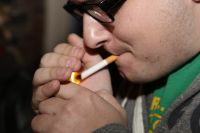By GIRISH SWAMINATH
ASSISTANT NEWS EDITOR

The new tobacco law is designed to discourage youth from starting to smoke. (Photo by Elizabeth Zanghi/The Ram)
On Tuesday, Nov. 19, the New York City Council passed a law in favor of raising the minimum age to purchase cigarettes from 18 to 21. The change will go into effect 180 days after the passing of the legislation.
Lawmakers passed the bill in response to statistics reported by the office of the Surgeon General, which stated that approximately 20,000 New York City high school students smoke. The statistics also indicated that 88 percent of adult smokers started smoking prior to the age of 18, and 90 percent of people purchasing cigarettes for minors are between the ages of 18 and 20. However, legislators questioned the effectiveness of the law in terms of curtailing the prevalence in smoking among New York City youths.
The implementation of the new law generated support and controversy among smokers and non-smokers alike, particularly within the Fordham community. However, some students remain indifferent.
“I really don’t care because if people want to smoke at 18, they will still get cigarettes, just like everyone at 18 can get alcohol,” Matt Cucino, FCRH ’14, said. “I guess fake IDs have a dual use now. I disagree with the fact that people can be drafted at 18 but cannot smoke until they turn 21.”
Other students believe that the law for cigarette smoking should not correlate to the legalization of alcohol at the age of 21.
“The smoking age should be assessed independently of the drinking age, because the substances carry different risks and are therefore not directly comparable,” Rachael Prensner, FCRH ’14, said. “After spending a semester abroad in Spain, I think the benefits of the U.S. drinking age are dubious at best. Alcohol is linked to drunk driving, overdose and belligerent behavior, and the social aspect of drinking exacerbates these factors, which in my opinion is something of a reason for a drinking age of 21 and which effectively makes it illegal among highschoolers. The danger of tobacco has more to do with long-term health, which, I would say at age 22, I am no more prone to responsibly evaluate than I was at 18. Furthermore, intoxication due to peer pressure isn’t really an issue here.”
Student smokers between the ages of 18 and 21 are disappointed with the passage of the law, since they can currently buy cigarettes legally but cannot buy cigarettes until they turn 21 once the law is in effect.
“Well, I am pretty mad because I am suddenly too young for something I have legally been buying and using for over a year,” Matt Tracey, FCRH ’16, said. “I don’t think it will keep kids from smoking. I know kids from my high school who asked older friends to buy them things like tobacco and alcohol that they were too young to buy, and they never really treated as a big deal. So, if kids want to smoke, they’re going to find a way.”
Other students are completely in support of the legislation, as similar efforts to reduce smoking rates have been successful across the country.
“As someone whose family life has been directly affected by the effects of smoking, I think any effort to limit its exposure to teens is absolutely positive,” Liz Green, FCRH ’14, said. “Two of my four grandparents died before I was born from health problems that were at minimum made far worse by their smoking habits, and my father today suffers from chronic health problems that stem directly from his exposure to chain smoking that occurred in his house 24/7 as a child. I’ve also read that studies show the clear benefits of similar legislation passed elsewhere, and so in my eyes it should definitely go ahead.”
Some students not only agree with the raising of the cigarette purchase age but also believe that smoking should be made completely illegal.
“I think that such legislation might prevent younger children and high school students from smoking,” Alison Silverman, FCRH ’14, said. “I doubt that it will have much of an effect on college campuses because underage students could easily acquire cigarettes from students who are 21 and older. Personally, I would like to see smoking made illegal, because the consequences of one’s decision to smoke can negatively affect so many people.”
